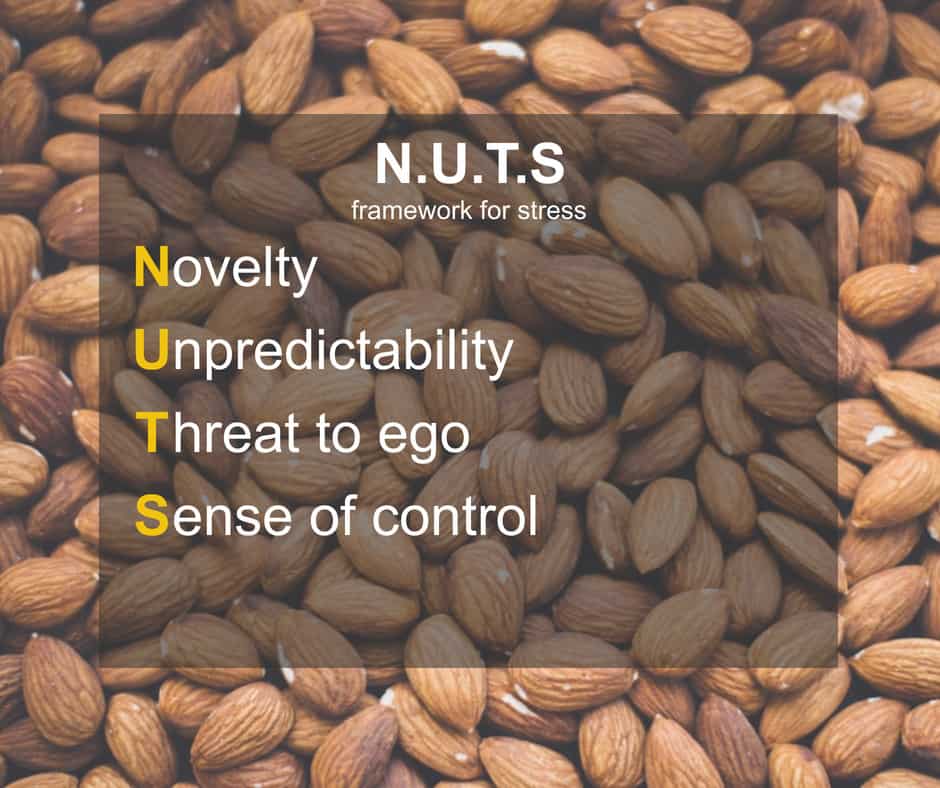Ah, stress. The effects of stress show up for all of us in different ways, but we all know it well, and we are becoming even more acquainted with it in recent days. How do we manage stress in times like these? What even is it?
For me, it helps to look at some of the history, theories and frameworks of stress as a starting point.
A brief history of stress.
Stress as it pertains to the human experience has been around seemingly forever. In the face of mortal danger, our ancestors needed to have a quick response in order to survive. Stress hormones were released when a sabertooth tiger was heard growling in the brush that allowed for fast action. Fight or flight. Our body’s alert system has taken us a long way over the millennia, but sometimes our brains can play tricks on us.
Stress, the concept, word, how we know it and use it in our daily vocabulary is relatively new. The concept started being used in the 1920s and was borrowed from its use in physics. In physics, “stress” describes “the force that produces strain on a physical body (a piece of metal bending until it snaps occurs because of the force, or stress, exerted on it).” 2
Stress in this way was first applied to the human body when the researcher Hans Selye noticed that patients in a hospital he was visiting all looked physically sick. In his determination, they were all under physical stress.
This concept of stress was later adapted to include both physical stress and mental or emotional stress. Researchers have found a connection between a person’s physical state and mental stress. They have found that physiological stress is just as powerful as physical stress at inducing the body’s stress response. Stress hormone levels increase in the body both in physically stressful situations as well as mentally stressful situations.
Research has shown that the types of stressors that induce the body’s stress response can be vastly different from individual to individual, but that there are common elements to situations that elevate stress hormones in everyone, across the board.
Stress hormones are released in the body when an individual encounters experiences that include one or all of the following conditions, in short, it’s N.U.T.S.

Let’s take a look at the N.U.T.S. framework, developed by Dr. Sonia Lupien – Founder and Director of the Centre for Studies on Human Stress, and how it relates to the recent international pandemic: COVID-19. For individuals like myself, this pandemic hits all 4 conditions of the N.U.T.S framework and can cause the release of large doses of stress hormones into the body. The experience of the pandemic is novel to me. I have never lived through a pandemic of this sort. It affects me in daily life. I have witnessed pandemics from afar — the bird flu, swine flu, and ebola to name a few. But witnessing something from afar is much different from living inside such a situation.
COVID-19 has brought with it a sense of unpredictability. Within a matter of several days here in Ohio, we went from life as generally defined as “normal”, to living under an order from the governor to shelter in place. It seems a new bit of news is given every day which has the potential to shift the ground underfoot again. The hustle and bustle of the typical day has been replaced by an eerie solitude. Local businesses are closed — and meat, canned food, and toilet paper are out of stock at the local supermarkets. Not knowing how others are going to react in the pandemic, along with news of the potential strain to the medical system, can cause threat to ego (or sense of self). All of these changes are happening so frequently and can lead to a sense of being out of control.
For me, the level and type of fear and uncertainty in the environment is unprecedented.
So what can we do in the face of this kind of stress?
Create a routine. Any kind of routine.
Sure, your day is going to look different than it did several weeks ago, you might be working from home for example. There’s no way around that. But you are not helpless in the middle of this situation.
As a way of buffeting the sense of being out of control, focus on the small things in your life that you can control. Set a time to wake up every day. Create a ritual in the morning. Start small. It doesn’t need to be elaborate. I have settled into a rhythm of taking my time making the perfect French press and letting it steep while I take my dog outside in the morning. Something as simple as this can go a long way to settling your nervous system and can be a grounding force to the start of your day. Try to maintain a sense of normalcy with a predictable schedule as best as you can throughout the day.

Give yourself a break.
Get used to it, y’all. There will be days that you aren’t as productive as you had been several weeks ago. We need to all come to terms with this – that right now we aren’t going to be blazing fast and productive in our work day. And that’s ok. The mental strain that goes along with all of the life changes presented to us right now divert energy and attention in unpredictable ways, and that will inevitably mean that we aren’t as productive as we have been in the past. And that’s ok. Don’t force yourself to take that extra, non-essential meeting in the day or stay up late to write that report. We’re all in this together, and there needs to be grace for yourself and others around you, especially on the front end of this change of pace. Be kind to yourself, and understand that it’s ok to take a break, to pause and breathe.
Avoid getting wrapped up in the news.
Some of you might find comfort in knowing all of the things you can about this virus. If that’s you then skip this tip. If you are more in the camp of stress binging news and feeling overwhelmed by all of the negativity that comes with it… well, maybe there’s something for you here.
Your attention is important, and all sorts of things are constantly vying for it all the time. The negative news cycle can really hack it’s way to the forefront of your attention. As humans, we are built to look out for, and key in on, any threats we perceive in our environment. It’s our most basic survival instinct. This is all good and fine, except for when that alert system is overstimulated and begins to work against us. The more attention you give to the news and other stressors, the less room you have for more helpful and productive activities.
This could be worth a try: Instead of going to social media or cable news to consume all the news you can manage, break your news consumption into digestible pieces, during different times of the day. As part of your routine, you could choose to spend ten minutes on Twitter while you’re having your morning coffee. As part of your evening routine, try limiting yourself to ten minutes of your favorite cable news program. This quick dip in and out can go a long way to keeping you informed, while not allowing you to slide down the rabbit hole of endless scrolling feeds. Putting a container around your news intake can be really helpful in easing the stress you are experiencing.
Find joy in the newness.
We all have a unique opportunity here. The change that is happening around us doesn’t need to be perceived only as negative. There are new moments of joy happening in your life right now. Moments of connecting with family and friends in ways that you have been prevented by being too busy in the past. New memories with your pets as they are climbing over you during that zoom call with your team after lunch are being formed. Researchers in recent years have been theorizing that stress is all perception(3). Seek out the good in the middle of the change, and your perception can tilt toward the positive, and maybe balance itself out in your mind. I, for instance, have found joy in taking small breaks and connecting with my kids throughout the day in ways that I haven’t been able to before. Like the other day when we spent ten minutes learning about quantum physics together. There are memories being created during this time that will be with you in a meaningful way for the rest of your life. Enjoy it.
Seek out the good in the middle of the change, and your perception can tilt toward the positive, and maybe balance itself out in your mind
Spend time with yourself.
Pay attention to how you are feeling. Get curious. Practice mindfulness (I like Dan Siegel’s wheel of awareness). Do breath work (I like Wim Hof). You aren’t doing much else, you might as well get comfy with yourself. Giving yourself room to feel and experience all the things that you are feeling will go a long way in orienting yourself in the unpredictable world around you. The world may be changing, but you can know yourself in the middle of that change and thus have a foot to stand on, and then you can be a stabilizing force for yourself, your family, and your community. Practicing this type of “self-care” can allow you to care for others more effectively than if you are not caring for yourself.
In the unsettledness there lies great opportunity to shift your typical ways of operating in the world to be more aligned with your values.
Life has stress, but in it there is opportunity
With all that is going on in the world right now, life can feel overwhelmingly stressful. But in the unsettledness there lies great opportunity to shift your typical ways of operating in the world to be more aligned with your values. Use this time to identify what is important to you, and create a vision of how you want your life to line up, both during the pandemic and after it. Take care of yourself, be kind to those around you, and don’t let things get too N.U.T.S.
Sources:

